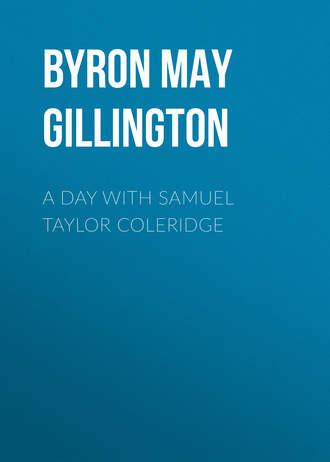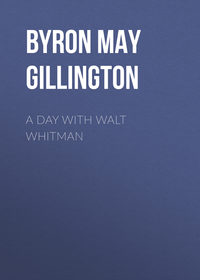 полная версия
полная версияA Day with Samuel Taylor Coleridge
Coleridge's mind was that extremely rara avis in terra, which combines the artistic with the philosophic temperament – two inherently-opposed qualities. His acute and sensitive perceptions of sound, sight, colour and romantic possibility did not in the least satisfy his heavy logical demands. Of art for art's sake he had the poorest opinion. He was of dual nature, – and where the philosopher, the metaphysician and the divine preponderated in him, they completely over-weighted the exquisite, ethereal imagination, which was so infinitely more precious, had he known it. And although in this golden year of his life, this annus mirabilis of his sojourn at Nether Stowey, – he was still allured to the marvellous, the strange and the supernatural, he sought to disguise his surrender to these phantasies, by clothing his desires in the garb of a severe philosophy of poetry. He decided, in concert with Wordsworth, that it would be well for him to undertake a series of poems in which, as he put it, "the incident and agents were to be, in part at least, supernatural: and the excellence arrived at was to consist in the interesting of the affections by the dramatic truth of such emotions as would naturally accompany such situations, supposing them real. And real in this sense they have been to every human being who, from whatever source of delusion, has at any time believed himself under supernatural agency."
A cold and unproductive soil this, one would suppose, in which to grow the glowing flowers of Christabel, where night itself, peopled with occult alarms, cannot minimise the mingled horror and splendour of Geraldine's first appearance.
Is the night chilly and dark?The night is chilly, but not dark.The thin gray cloud is spread on high,It covers but not hides the sky.The moon is behind, and at the full;And yet she looks both small and dull.The night is chill, the cloud is gray:'Tis a month before the month of May,And the Spring comes slowly up this way.The lovely lady, Christabel,Whom her father loves so well,What makes her in the wood so late,A furlong from the castle gate?She had dreams all yesternightOf her own betrothed knight;And she in the midnight wood will prayFor the weal of her lover that's far away.She stole along, she nothing spoke,The sighs she heaved were soft and low,And naught was green upon the oak,But moss and rarest mistletoe:She kneels beneath the huge oak tree,And in silence prayeth she.The lady sprang up suddenly,The lovely lady, Christabel!It moaned as near, as near can be,But what it is, she cannot tell. —On the other side it seems to be,Of the huge, broad-breasted, old oak tree.· · · · · ·There she sees a damsel bright,Drest in a silken robe of white,That shadowy in the moonlight shone:The neck that made that white robe wan,Her stately neck, and arms were bare;Her blue-veined feet unsandal'd were,And wildly glittered here and thereThe gems entangled in her hair.I guess, 'twas frightful there to seeA lady so richly clad as she —Beautiful exceedingly!And a chilly basis, these solemnly-propounded theories, for the gorgeous fabric of The Ancient Mariner. Originally founded, as regards its main outlines, upon a dream which occurred to Cruikshank, – a dream of a skeleton ship with figures in it, – who could have anticipated such results as that unforgettable scene where "The Ancient Mariner beholdeth a sign in the element afar off"? —
The western wave was all a-flame;The day was well nigh done;Almost upon the western waveRested the broad bright Sun;When that strange shape drove suddenlyBetwixt us and the Sun.And straight the Sun was flecked with bars(Heaven's Mother send us grace!)As if through a dungeon-grate he peeredWith broad and burning face.Alas! (thought I, and my heart beat loud)How fast she nears and nears!Are those her sails that glance in the Sun,Like restless gossameres!Are those her ribs through which the SunDid peer, as through a grate?And is that Woman all her crew?Is that a Death? and are there two?Is Death that woman's mate?Her lips were red, her looks were free,Her locks were yellow as gold:Her skin was as white as leprosy,The Nightmare Life-in-Death was she,Who thicks man's blood with cold.The naked hulk alongside came,And the twain were casting dice;'The game is done! I've won! I've won!'Quoth she, and whistles thrice.The Sun's rim dips; the stars rush out:At one stride comes the dark;With far-heard whisper, o'er the sea,Off shot the spectre-bark.We listened, and looked sideways up!Fear at my heart, as at a cup,My life-blood seemed to sip!The stars were dim, and thick the night,The steersman's face by his lamp gleamed white;From the sails the dew did drip —Till clomb above the eastern barThe hornéd Moon, with one bright starWithin the nether tip.Or who could have supposed that Wordsworth's subsequent suggestion for the plot of the poem, "Suppose you represent the Mariner as having killed an Albatross on entering the South Sea, and that the tutelary spirits of these regions take upon themselves to avenge the crime," should develop into that magnificent defence of the animal right to live, which, in Coleridge's opinion, obtruded a moral sentiment too openly in a work of such pure imagination? The curse of remorse, throughout the whole story, hangs as heavy on the seaman's soul as does the dead weight of the Albatross around his neck: until that mystical moment when he blesses the beauty of the "happy living things" in the water, "God's creatures of the great calm,"
The moving Moon went up the sky,And no where did abide:Softly she was going up,And a star or two beside.Her beams bemocked the sultry main,Like April hoar-frost spread;But where the ship's huge shadow lay,The charmed water burnt alwayA still and awful red.Beyond the shadow of the ship,I watched the water-snakes:They moved in tracks of shining white,And when they reared, the elfish lightFell off in hoary flakes.Within the shadow of the shipI watched their rich attire:Blue, glossy green, and velvet black,They coiled and swam; and every trackWas a flash of golden fire.O happy living things! no tongueTheir beauty might declare:A spring of love gushed from my heart,And I blessed them unaware:Sure my kind saint took pity on me,And I blessed them unaware.The self-same moment I could pray;And from my neck so freeThe Albatross fell off, and sankLike lead into the sea.THE MARINER RECEIVES COMFORT IN PRAYER"The self-same moment I could pray:And from my neck so freeThe Albatross fell off, and sankLike lead into the sea."(The Ancient Mariner).… Side by side the three friends wandered over the May-sweet hillsides, – dipping into wooded combes, musical with the sound of streams, – climbing the heathery slopes, resting here and there upon some glorious crest to drink in all the joy and colour of the landscape, and to reflect, in Coleridge's own words, how —
Flowers are lovely; Love is flower-like;Friendship is a sheltering tree.Each of them young, – each of them passionate lovers of Nature, – each brimming with hopes, and equipped with commanding intellect, – they formed the three-fold chord, with its tonic, dominant and mediant, of which is born all music…
It was nearly eight o'clock when Coleridge parted from the Wordsworths at the gate of Alfoxden. They were happily tired after some nine hours' rambling, and a serene joy lit up their faces, as of those who have passed through some enchanting experience, – who have touched at some oasis of sheer delight. Coleridge tried to frame his thoughts into words, as he strode homeward with his loose shambling gait, continually shifting from one side of the path to the other after his notorious "corkscrew" habit. The notes of the nightingale, poignantly sweet, echoed to him out of the woods, – and he would gladly have lingered to listen; but, instead, he thought —
Farewell, O Warbler! till to-morrow eve,And you, my friends! farewell, a short farewell!We have been loitering long and pleasantly,And now for our dear homes. – That strain again!Full fain it would delay me! My dear babe,Who, capable of no articulate sound,Mars all things with his imitative lisp,How he would place his hand beside his ear,His little hand, the small forefinger up,And bid us listen! And I deem it wiseTo make him Nature's play-mate. He knows wellThe evening star; and once, when he awokeIn most distressful mood (some inward painHad made up that strange thing, an infant's dream)I hurried with him to our orchard-plot,And he beheld the Moon, and, hushed at once,Suspends his sobs, and laughs most silently,While his fair eyes, that swam with un-dropped tears,Did glitter in the yellow moonbeam! Well! —It is a father's tale. But if that HeavenShould give me life, his childhood shall grow upFamiliar with these songs, that with the nightHe may associate joy! Once more farewell,Sweet Nightingale! Once more, my friends! farewell.Sara met him in the road with a despondent air. "Lloyd has gone," said she.
"Gone! what, actually gone! Do you mean to say he has left us?" exclaimed Coleridge, horrorstruck.
"He packed up his things and took leave of me," she replied; "it seems he hired a conveyance from Bristol to fetch him home."
"Good Heavens!" cried her husband: and all the tranquil joy died out of his face; nothing but weariness, flabbiness and dejection remained. "Did he give no reason?"
"O, he said things about the Wordsworths," replied Sara. "He thinks you have neglected him shamefully. So do I." And she shut her mouth with a snap.
Coleridge, though so prolific a conversationalist, and so prone to speech, knew when there was a time to be silent. He attempted no defence or excuse. He simply went indoors, and sitting distastefully to an unprepossessing supper, let Sara say her say upon the subject of Lloyd: it was an extensive and a justifiable recrimination. Then – still in the same abstracted and monosyllabic state, – he helped to wash up, attended – better late than never – to the pigs and fowls, and sat before the fire, with a note-book in his hands and baby-clothes pinned to warm upon his knees, while Sara put the child to bed. He was working out with patient care those apparently unpremeditated effects which go to make up the haunting melody of Christabel. For, skilful and accomplished metrist as he was, it was only by dint of "repeated experiments and intense mental effort" that he achieved those results in which his art appears most artless. However, he was in no fit state, over-tired and distressed as he felt, for laborious efforts of this kind: and presently Nature took vengeance upon him in the form of intolerable toothache. A little while he bore it: then, moving tip-toe lest he should be heard in the upper room where Sara was soothing the little one to sleep, he stole to a corner cupboard and took out a bottle of laudanum. In this false friend and insidious comforter he had already found relief and repose from mental, as from physical troubles, – more and more frequently he had recourse to it. He knew its fatal tendency to undermine the will and debilitate the constitution, yet he could not deny himself an artificial peace which he described as "a spot of enchantment, a green spot of fountains and trees in the very heart of a waste of sand."
And immediately he began to view things couleur de rose. The sharp tongue and angry face of Sara became transmogrified into the gentle semblance of her anagram, the imaginary Asra of his poems, —
To be beloved is all I need,And whom I love I love indeed.· · · · · ·O ever – ever be thou blest!For dearly, Asra! love I thee!This brooding warmth across my breast,This depth of tranquil bliss – ah, me!Fount, tree and shed are gone, I know not whither,But in one quiet room we three are still together.The shadows dance upon the wall,By the still dancing fire-flames made;And now they slumber moveless all!And now they melt to one deep shade!But not from me shall this mild darkness steal thee:I dream thee with mine eyes, and at my heart I feel thee!The visions born of opium floated in vague, rich phantasmagoria across his slumbrous brain,
And so, his senses gradually wraptIn a half-sleep, he dreams of better worlds,– sitting in the failing firelight. With a great effort he roused himself to creep up the stair-ladder, and to lay his drugged limbs upon the hard straw bed. The child and Sara were already dreaming: he gazed at them with serene affection:
Dear Babe, that sleepest cradled by my side,Whose gentle breathings, heard in this deep calm,Fill up the interspersed vacanciesAnd momentary pauses of the thought!My babe so beautiful! it thrills my heartWith tender gladness, thus to look at thee!and lastly, with all the mental power yet left him, he committed himself to the God of whom he was so weak, so well-intentioned a worshipper:
Ere on my bed my limbs I lay,It hath not been my use to prayWith moving lips or bended knees;But silently, by slow degress,My spirit I to Love compose,In humble trust mine eye-lids close,With reverential resignation,No wish conceived, no thought expressed.Only a sense of supplication, —A sense o'er all my soul impressedThat I am weak, yet not unblest,Since in me, round me, every whereEternal Strength and Wisdom are.But now the stealthy narcotic utterly beclouded him: he sank away as through unfathomable gulfs of somnolence. Samuel Taylor Coleridge had closed another day.









